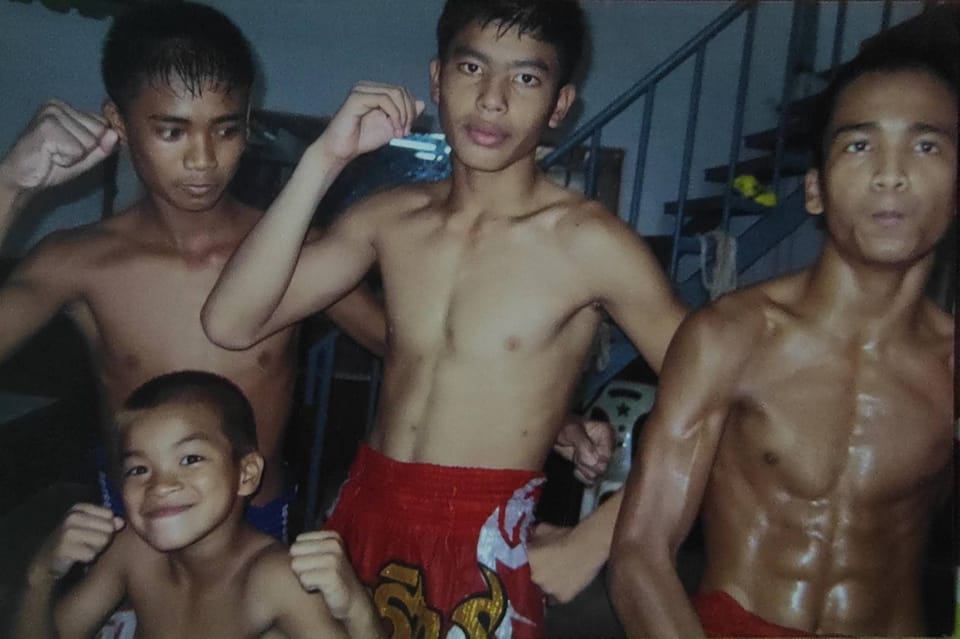Topnoi Kiwram counts himself as lucky.
His plans to become the first male Thai fighter signed to the UFC are well on track after a win in the Road to UFC competition last July in Singapore. This weekend, Topnoi fights in the flyweight semifinals of Road to UFC: Episode 5 in Abu Dhabi as part of the warm-up to UFC 280.
Yes, things are on track, but they weren’t always so. Reflecting on his journey recently, Topnoi revealed how closely his career was very nearly derailed by the drugs and excess that follow the best fighters in Muay Thai, the country’s national sport.
It’s an art that Topnoi excelled in, and became revered as a fighter. And it’s a sport that does not exist in a vacuum, he explained to The AllStar. Wherever money, fame, and success go, shady characters get involved. For Topnoi, it all began when he was in his late teens, as his rising stardom sucked him into Muay Thai’s seedier underbelly.
“It was always when you’re doing really well for yourself,” he said. “That’s coincidentally also when you’ve got the most friends.”
“There are all these people that want to take part in that.”
Temptations
His reflections reverberate beyond Muay Thai, echoing the tales of many athletes, regardless of sport or country, whose fame and success act as a lure for profiteers and opportunists.

“That’s the temptation, to get into drugs, alcohol, prostitutes. It’s up to the individual if they want to be a part of that or not,” said Topnoi. “The network in Muay Thai is so intricately linked to just about every community you can think of, including prostitution rings, gambling rings, drugs, the mafia – it’s basically all tangled together.”
“Especially when you’re making good money and you’re famous, people are attracted to being near you, and maybe not for the right reasons,” he said.
It’s a familiar story experienced by many of Muay Thai’s top prospects, according to George Hickman, head coach of Bangtao Muay Thai and MMA. Hickman and his brother Frank have a long association with Thailand’s combat scene, having previously trained fighters at Tiger Muay Thai before leaving to start their own gym in Northern Phuket.
“A lot of Muay Thai fighters come from very impoverished areas with low education,” Hickman said. “So when they come into fame and money, sometimes they aren’t equipped with the tools to navigate it.”
Beer and whiskey
Topnoi explained how quickly he would burn through fight winnings in the week after a fight. Weeklong after-parties followed paychecks, where he’d commonly front the bill for the drinks and entertainment. Although he doesn’t remember what went on at many of the parties, he does remember leaving a portion of his paycheck at the gym for safekeeping.
The temptation to feel rich and powerful often drove these parties, which became the norm in his early 20s: “Beer, whiskey, cigarettes, all that stuff. Once you find it and once you make it a part of your regular life, you’ll see it everywhere.
“It becomes part of your regular life really, really quickly. After winning a bunch of fights and making a lot of money, [I] would feel rich for a week, [I] would pay for everyone’s drinks, and that money disappears pretty quickly.”
And then, there is “Yaba,” a Thai methamphetamine. The drug is a stimulant that Topnoi describes as “the opposite of weed” and makes users hyperactive.
He first discovered it at a Muay Thai gym where an older fighter told him that it would make him more powerful. Instead, Topnoi said it’s “like wires in your head crossed the wrong way. There’s no benefit to it.”
Drug abuse
Unfortunately, the extremely low price of Yaba and the accessibility of the drug make it hard to cut off. Life for Topnoi became less about spending time with friends and more about finding the next fix.
“You start to become a different person,” he said. “You sort of lose awareness of your surroundings, outside of getting that next high. It becomes very difficult to get out of that life when you’re addicted. [Those] people are a part of your life are not good for you. In a lot of ways, it can really ruin your life.”
Fortunately, Topnoi turned to rehab before things got too out of hand. While the power to quit ultimately rested in his own determination, the rehab clinic gave him the framework to stay on track.
“The rehab feels like a training camp in itself, almost like a military barracks where you’re staying with other people who are addicted. You get tested twice a day to make sure those drugs are not in your system. You get up and you exercise, they have stuff on schedule that keeps your life regular and active.”
Topnoi has stayed clean for several years, admitting to not going near addictive drugs. He’s now got a path to a UFC contract through the Road to UFC tournament – provided he wins, that is.
His opponent this weekend is former training partner Hyun Sung Park. All training loyalties go out the door come October 23.
One advantage Topnoi has is the knowledge that he’s overcome more adversaries than simply those on the other side of the cage. While it was a “valuable life experience,” his regret is pretty clear – and perhaps a wistful notion of what might have been:
“If I had a choice to go back and make it so it never happened, I wouldn’t do it.”
With the help of Alex Schild and Andrew Wood, the Hickman brothers cultivated the first-ever Thai fighter in the UFC, Loma Lookboonmee. And now they are working on making history again.
Whether he wins or loses, Topnoi’s story already resonates and serves as a guiding light for young Muay Thai fighters.
“Topnoi is a role model to many currently in the sport that feel like there is no future,” said Bangtao Muay Thai’s Hickman. “Him just competing in the Road To UFC is inspirational, let alone getting a UFC contract.”
Translation provided by Che

